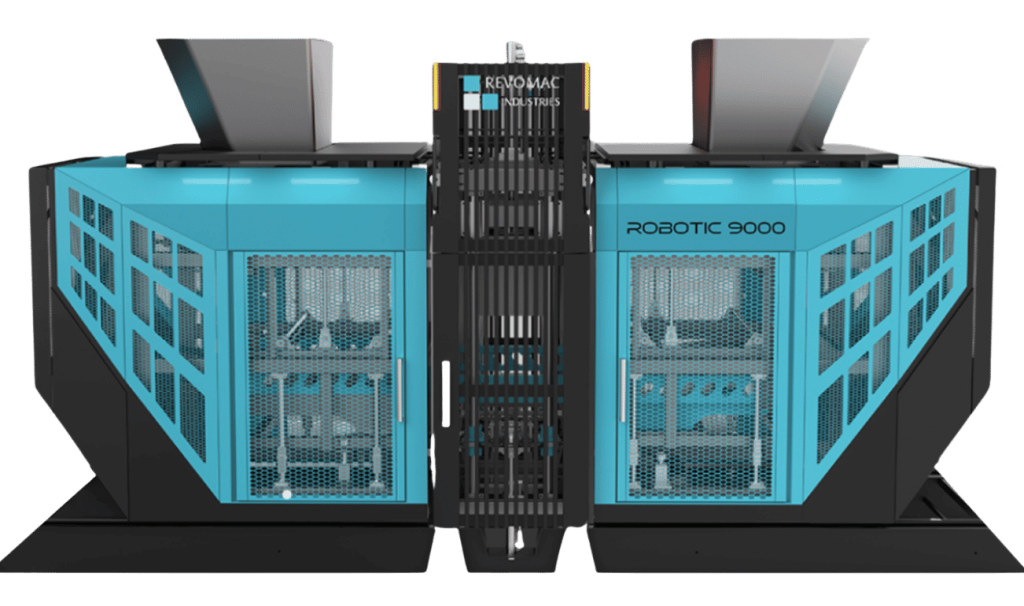 Skip to content
Skip to content
Brick manufacturing has come a long way from traditional hand-moulding methods to today’s highly automated production lines. With rapid advancements in technology, the industry is now stepping into a new era — one defined by automation, robotics, and artificial intelligence (AI).
Modern construction demands efficiency, precision, and sustainability, and brick manufacturers are turning to smart machines and AI systems to meet these expectations. This digital transformation not only improves production speed and consistency but also ensures long-term cost savings and eco-friendly operations.
Let’s explore how automation and AI are shaping the future of brick manufacturing, and what it means for business owners, workers, and the industry at large.

Automation is the backbone of today’s modern brick factories. It ensures consistency, saves labour, and boosts productivity.
Automated Brick Making Machines
Automated brick machines perform multiple tasks — from feeding raw materials and mixing to moulding, curing, and stacking — with minimal human intervention. These systems combine vibration, hydraulic compression, and automated conveyors to ensure precise compaction and faster output.
Benefits include:
Smart Sensors and Real-Time Monitoring
Smart brick plants now use sensors to monitor temperature, moisture, and pressure during the curing process. Data collected from these sensors is analysed in real time, helping operators identify and fix issues early. This ensures consistent brick strength and colour while reducing rejections.
Artificial Intelligence is taking automation to the next level by enabling data-driven decision-making and self-learning systems. Instead of simply performing repetitive tasks, AI allows machines to think, predict, and optimise the entire production process.
Unplanned machine breakdowns can cause major production losses. AI helps prevent that by monitoring equipment health through vibration, temperature, and pressure data. If an anomaly is detected, the system alerts operators before a failure occurs saving both time and repair costs.
AI can also optimise raw material ratios, vibration frequency, and curing time. For instance, if a batch has excess moisture, the system automatically adjusts the drying cycle to maintain quality. This leads to more energy-efficient and consistent production with minimal human supervision.
AI algorithms help manufacturers forecast raw material needs and customer demand. This ensures the right amount of cement, sand, and aggregates are available, avoiding shortages or overstocking. AI also assists in scheduling deliveries and managing warehouse inventory efficiently.
Automation and AI-powered systems may sound futuristic, but their adoption is becoming increasingly affordable. Here’s a look at the cost range of various machines used in the industry today.
The cost depends on factors like capacity, automation level, energy consumption, and brand reputation. Investing in a reliable, automated system pays off in higher efficiency and long-term savings.
Automatic Cement Brick making machine prices vary based on material type and output:
Concrete block machines, designed for hollow or solid blocks, have a wide cost range:
AI-enabled machines, while costlier initially, offer faster ROI due to their higher speed, lower labour cost, and precision quality control.
The integration of automation and AI brings numerous advantages for manufacturers:
Globally, countries like Germany, China, and India are investing in smart brick manufacturing plants.
For example:
A plant in Gujarat recently introduced AI-assisted brick presses that monitor curing temperature automatically, reducing defects by 25%.
European factories use robotic stackers and IoT-based curing chambers, achieving 40% faster production rates.
These real-world examples show how automation enhances both output and quality, helping manufacturers remain competitive.
The next decade will witness the rise of fully automated “Smart Brick Plants” powered by robotics, IoT, and AI.
These factories will:
Predictive analytics will also help forecast demand and adjust production accordingly, preventing overproduction and waste.
As the construction industry moves towards sustainable materials, AI will be key in designing energy-efficient, low-emission brick plants.